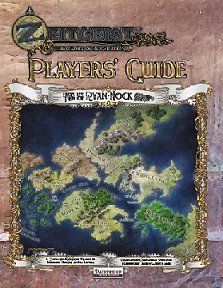
Essential reading for anyone interested in the Zeitgeist Adventure Path, and with it being available as a free PDF download with the option to purchase a printed version if you prefer, it's quite safe to say that! Starting with some evocative fiction to set the scene, a brief Introduction explains the contents of this work - aimed at players and GMs alike - and gives a brief pronuciation guide, which makes everything sound like Welsh pronounced with a strong American accent! There's also a note that, despite the underlying theme involving tension between industrial/technolgical advances and magical tradition, those who don't like tech in their fantasy can substitute either arcane magic or psionics for technology, with their 'traditionalists' being divine spellcasters. Likewise, although the game is set squarely in its own setting, you can adapt it to take place in another alternate reality of your choosing. The next couple of pages repeat the contents of the Player's Primer, describing a little setting, background and timeline, and presenting a map.
Section 1: Characters covers what you need to know to create characters suited to the setting and campaign. The default assumption is that characters are members of the Homeland Constabulary, but if preferred, they may work for some other law enforcement agency or be hired in by the Constabulary as specialists. Basically, it's possible to play just about any race or character class that is available in standard Pathfinder games, although some will be quite unusual here or may need a little work to fit in. Clerics are rare, as there are no established churches and deities tend to be less involved in mortal affairs than in some settings; but druids and oracles abound. Just about all magics work, apart from long-duration flight and planar travel, and dragons are presumed to be extinct. Technology is quite low-impact, aside from a sooty atmosphere, most noticeable in this new-fangled railway and some primitive firearms, muzzleloaders in the main.
The discussion moves on to the really neat innovation of character 'themes.' These are background and flavour options, which work mechanically in a similar manner to traits, only you may have just the one theme. All fit well with the setting of this campaign, and may need changing if you intend to tamper with it. Nine themes are on offer, each offering an interesting angle. For example, there's the Docker, who is not a mere stevedore but a member of an informal and innovative artistic movement. A bit anarchistic, they favour impromptu performances of music, graffiti, stand-up or even freestyle philosophy. Both Gunsmiths and Martial Scientists are fascinated by the fusion of technology and combat, with the former specialising in firearms and Martial Scientists taking a formal analytical approach to warfare itself. As you can see, the themes allow you to choose your character's whole approach to life, rather than a profession or allegience.
There also are details of income, and of the novel contraptions and substances available to spend it on - even recreational drugs if that's your character's thing! Then comes a system of 'Prestige' which is a reputation-based method for determining how easy it is for a character to obtain unusual items or call in favours, necessary arts in navigating the bureaucracy inherent in an organisation like the Constabulary.
Next is Section 2: Setting Overview. Here's the stuff your character knows, because he grew up there, neatly summarised for the benefit of players who didn't. The action is centred around the subtropical kingdom of Risur, where emerging technology vies with ancient magical heritage, and its relationships with neighbouring states. Cities, nature, cuisine, religious belief, and more are covered - and for those who want to get deep into character there's even suggestions for adapting real-world accents to different nations so they actually sound different! There's a lot here and it will repay careful study, so as to become embedded into this alternate reality and see it come to life in your game. The Royal Homeland Constabulary serves to protect Risur from any threat, internal and external, and is said to use any means legal or otherwise to achieve its ends. There's plenty about other lands as well, to facilitate playing characters who come from there or to inform trips abroad.
Finally, Section 3: Flint looks more closely at the dominant city of Flint, the technological capital (although not the legislative one) of Risur in which at least the initial stages of the campaign are to be focussed. Characters are advised to get to know it well, and there's a map and gazetteer to aid you. There is also detail on the organisation, responsibilities and powers of the Royal Homeland Constabulary, and a selection of key NPCs characters will encounter in the adventures to come.
Oh, and everyone is paranoid about teleportation. Be it the threat of someone teleporting in about some mischief or even teleporting out with a kidnap victim. Fortunately, it can be blocked... with gold, provided that gold forms a complete ring. Shall we just say that golden handcuffs take on a whole new meaning...
It's an excellent overview of a well-designed setting that leaves you itching to create a character and dive on in, an excellent way to get everyone eager to play or GM the campaign to come!
Return to Zeitgeist Adventure Path Player's Guide page.
Reviewed: 5 July 2011

